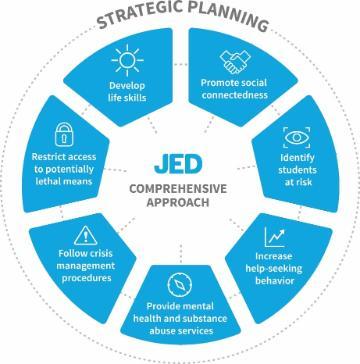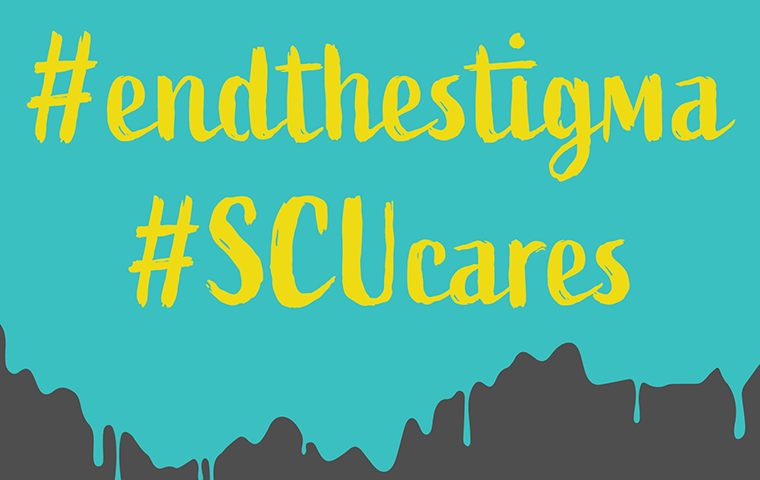COVID-19 & FALL 2021 UPDATES
For up-to-date information please visit Prepared SCU and read the latest campus messages.
Santa Clara University is a JED Campus.

By becoming a member of the JED Campus program, a school demonstrates a commitment to the emotional well-being of its students. JED Campus schools embark on a multi-year strategic collaboration that not only assesses and enhances the work that is already being done but helps create positive, lasting, systemic change in the campus community.
JED Campus is an initiative of The Jed Foundation, a national nonprofit that exists to protect the emotional health of our country’s 40 million high school and college students and reduce the risks of substance abuse and suicide. To learn more visit www.jedcampus.org.
JED Campus Program Committee
- Deepa Arora, Director, Media and Internal Communications
- Nicole Banks, Outreach Coordinator and Suicide Prevention Specialist
- Philip Beltran, Director, Campus Safety Services
- Bridget Colbert, Assistant General Counsel
- Heather Dumas-Dyer, Director of Residence Life
- Matthew Duncan, Associate Dean for Student Life
- Emma Fontana, Class of 2021
- Ryan Holleman, Assistant Athletic Director, Sports Medicine
- Molly McDonald, Chief of Staff, Office of the President
- Kate Mayberg, Class of 2021
- Nina Molanphy, Class of 2021
- Kate Morris, Vice Provost for Academic Affairs
- Ariel Perlman, Class of 2023
- Jeanne Rosenberger, Vice Provost for Student Life, Co-Chair
- Jill Rovaris, Director of the Cowell Center, Co-Chair
- Melanie Sam, Class of 2022
- Julia Claire Santos, Associate Director, Campus Ministry
- Kelly Schumacher, Director of Wellness Center
- Chan Thai, Asst. Professor of Communication
JED Comprehensive Approach
The Strategic Planning Process

STRATEGIC PLANNING
Lead: Jeanne Rosenberger, Vice Provost for Student Life and Dean of Students
Strategic planning allows schools to anticipate and evaluate clinical and programming needs, examine how they deploy both personnel and financial resources to address challenges, coordinate efforts across campus, and evaluate programming effectiveness.
OBJECTIVE:
Ensure that emotional well-being is a campus wide responsibility.
ACTION STEPS:
- Implement campus wide educational campaigns:
- that promote shared responsibility for student emotional well-being
- to educate the campus community about the links between physical and emotional health and academic success
- to encourage help seeking behaviors and to destigmatize mental health and substance abuse problems
- designed to educate students about the risks and dangers of opiate misuse, including the effects with other substances
- Ensure the campus community is aware of the JED Campus strategic plan and the work of the task force
- Develop and implement an assessment plan to evaluate the effectiveness of interventions or services implemented through the JED Campus Action Planning process
- Develop and implement an Alcohol and Other Drug (AOD) Strategic Plan
- Develop a process to evaluate the current relationship between the University and fraternities and sororities
DEVELOP AND SUPPORT LIFE SKILLS
Lead: Heather Dumas-Dyer, Director of Residence Life
Supporting life skills education is valuable in teaching healthy ways to cope with the stress of college life. Some of the life skills that are important to a student's well-being include managing friendships and relationships, problem-solving, decision making, identifying and managing emotions, healthy living, and finding the purpose, meaning and identity.
OBJECTIVE:
Teach students the skills necessary to cope with the stresses of college life, make wise lifestyle choices, and be academically successful.
ACTION STEPS:
- Offer or enhance programming and/or groups on (drop down: e.g. communication skills, identifying and regulating emotions/promoting resillience, managing finances, conflict resolution, bystander training programs, relationship skills, sexual harassment/relationship violence, stalking, bullyin, and/or hazing)
- Offer or enhance programming and/or services targeting academic skills in the areas of (drop down list of: study skills, test anxiety, stress management and time management)
- Offer or enhance comprehensive programming on the effects of lifestyle choices on wellness (e.g. adequate sleep, exercise, nutrition, etc.)
PROMOTE SOCIAL CONNECTEDNESS
Lead: Julia Claire Santos, Associate Director, Campus Ministry
Research has shown that loneliness and isolation are significant risk factors for mental health problems and/or suicidal behavior. Therefore, supportive social relationships and feeling connected to campus, family and friends are protective factors that can help lower risk.
OBJECTIVE:
Implement sustainable programs that offer students the opportunity to build connections with others in their community.
ACTION STEPS:
- Establish defined spaces in student unions and/or other public areas for student groups to meet
- Develop proactive Action Steps to help identify disconnected/isolated students
- Develop or enhance programs and activities to promote inclusion of disconnected/isolated students on campus
- Offer or enhance programs, activities, and campaigns that promote connectins to community-based, cultural, religious or national groups
- Offer or enhance programs, activities, and campaigns to promote tolerance and inclusiveness on campus
- Develop peer mentoring programs
IDENTIFY STUDENTS AT RISK
Lead: Dr. Kathy Lee, Assistant Director of CAPS
It is important to take action to identify students at risk for mental health problems and/or suicidal behavior, and also to promote emotional health awareness among those who interact with students the most - "gatekeepers" such as residence hall staff, academic advisors, faculty and even fellow students - as it is vital for these people to be able to recognize and refer a student who might be in distress.
OBJECTIVE 1:
Ensure incoming students with mental health and substance abuse histories are supported in their transition to college.
ACTION STEPS:
- Educate families of incoming students regarding mental health and substance use resources and services on campus
OBJECTIVE 2:
Provide robust screening opportunities at diverse touchpoints in the student experience.
ACTION STEPS:
- Implement screening/wellness days focused on substance use and common mental health issues on a regular basis
- Implement standardized screenings by health service clinicians at all primary care visits for substance use/misuse and common mental health problems
- Provide and publicize screening tools for depression, anxiety, and substance use disorders on the counseling and/or health education websites
OBJECTIVE 3:
Train campus community members to identify, reach out to, and refer students who may be struggling.
ACTION STEPS:
- Develop, expand, or strengthen gatekeeper-training program for relevant campus faculty and staff in identifying, reaching out to, and referring students who may be struggling
- Train students to identify, reach out to, and refer their friends/peers who may be struggling with mental health or substance issues
INCREASE HELP SEEKING BEHAVIOR
Lead: Kelly Schumacher, Director of Wellness Center
Many students who need help may be reluctant or unsure of how to seek it out. Obstacles to help-seeking include lack of awareness of mental health services, skepticism about the effectiveness of treatment, prejudices associated-with mental illness, and uncertainty about costs or insurance coverage. Campuses should engage in a variety of activities designed to increase the likelihood that a student in need will seek help.
OBJECTIVE:
Promote help seeking behavior through destigmitization efforts and increased access to resource information.
ACTION STEPS:
- Ensure that counseling and health center websites are easily accessible for students
PROVIDE MENTAL HEALTH AND SUBSTANCE ABUSE SERVICES
Lead: Dr. Jill Rovaris, Director of the Cowell Center
It is essential to offer accessible, consistent and high-quality mental health services to students. To make mental health and substance abuse care more comprehensive, it should include strong and flexible services, adequate staffing levels and staff diversity reflective of the student population, flexibility in treatment approaches, and clinic hours that are reflective of student schedules. Since most college clinics are free, the length of treatment is often limited. Therefore, it is important that campus mental health services can assist students in finding off-campus resources that can provide long-term care if needed.
OBJECTIVE 1:
Ensure students have adequate and comprehensive health insurance coverage.
ACTION STEPS:
- Develop or refine resources to educate students and families in making informed decisions when choosing a health insurance plan
OBJECTIVE 2:
Ensure leave policies and protocols best support students in distress.
ACTION STEPS:
- Refine a written medical leave of absence policy that is consistent with JED Campus recommendations
- Refine a written return from leave protocol that is consistent with JED Campus recommendations
- Offer a tuition insurance policy that has parity between medical leaves for physical and mental health concerns
OBJECTIVE 3:
Establish systems, protocols and processes that best coordinate necessary care for students.
ACTION STEPS:
- Ensure access to psychiatric medication management (on or off campus) when indicated
- Collect data on student utilization and incidents on campus related to mental health/substance abuse
OBJECTIVE 4:
Expedite, increase, and ensure access to all necessary clinical care services, including after-hours care.
ACTION STEPS:
- Offer clinical services outside of typical "business hours"
- Provide counseling services in alternative locations on campus
- Develop or refine protocols to manage after-hours/emergency situations
- Develop or refine MOUs with local emergency services
OBJECTIVE 5:
Ensure substance abuse policies and protocols best support students
ACTION STEPS:
- Develop/refine a policy on alcohol and other drugs that is consistent with JED Campus recommendations
- Develop/refine protocols for responding to alcohol and drug overdoses that are consistent with JED Campus recommendations
- Publish all alcohol and other drug policies
- Develop/refine poilcies and protocols for prescription of opiates, tranquilizers (bensodiazepines and sleep medicines) and stimulants
- Avail emergency Naloxone doses to those at risk for overdose (as permitted by local law)
FOLLOW CRISIS MANAGEMENT PROCEDURE
Lead: Molly McDonald, Chief of Staff, Office of the President
The campus should have access to a well-publicized 24/7 crisis phone and/or chat line either through campus resources or local/national services. There should be a process in place to share information (as legally appropriate) between local ERs and school health and/or counseling services.
OBJECTIVE 1:
Ensure an adequate and appropriate institutional response to student suicide, death, or other emergency.
ACTION STEPS:
- Refine postvention protocol to be consistent with the HEMHA guide
- Ensure postvention protocal is easily accessible to relevant campus constituents
OBJECTIVE 2:
Ensure that protocols are established for the reporting of, and follow-up for, emergency situations.
ACTION STEPS:
- Promote information about how to report/get help for an emergency for both daytime and after-hours
- Promoto 24/7 crisis campus resources or local/national services (phone/text/chat line)
RESTRICT ACCESS TO POTENTIALLY LETHAL MEANS
Lead: Phil Beltran, Director of Campus Safety Services
It has been well established that if the means to self-haram are removed or limited in an environment, it can prevent suicide and even limit accidental deaths. This is called "means restriction. " Limiting students' access to weapons, poisonous chemicals and rooftops, windows or other high places are all means restriction activities. Each campus should do an environmental scan for potential access to lethal or dangerous means.
OBJECTIVE:
Proactively minimize environmental risks for suicide.
ACTION STEPS:
- Conduct an annual campus environmental scan to identify and mitigate access
- Implement installation of breakaway closet rods
- Implement drug collection/drug return programs for prescription medications on campus
Care for the whole person means giving opportunities for students to flourish. It also means providing help when it’s needed—including with mental health. A conversation with Vice Provost for Student Life Jeanne Rosenberger.
Students and health professionals on the help available in times of need—and new efforts to get the word out.
College can be taxing on your mental health, says SCU Communication Assistant Professor Chan Thai. Talking about it can help.


